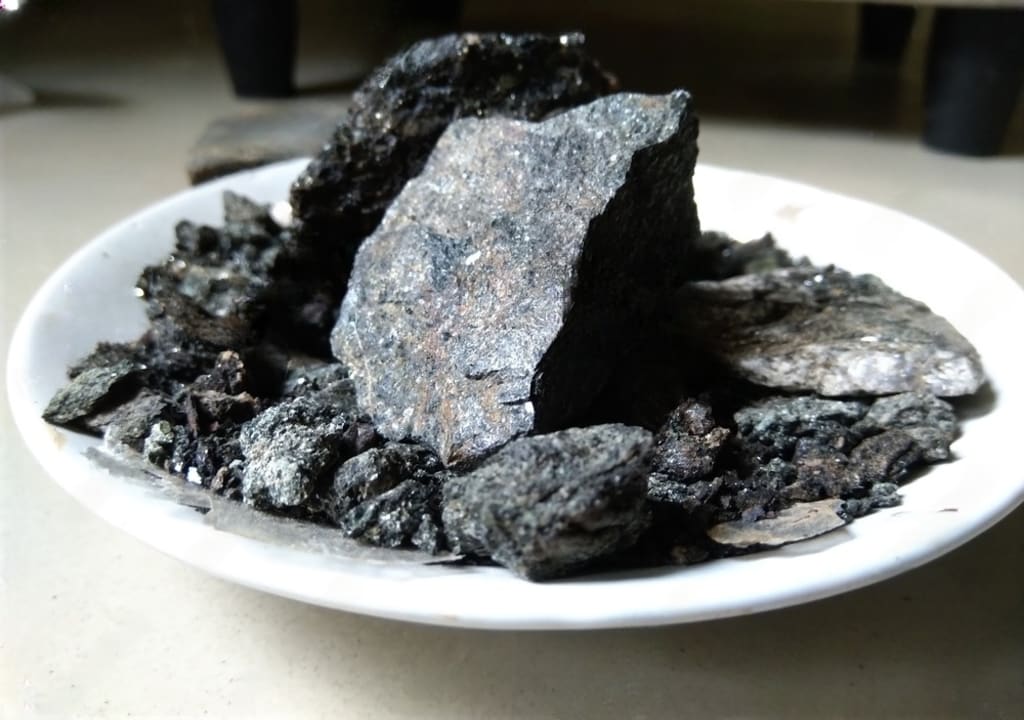Health Gift From Gilgit-Baltistan
Shilajit "The destroyer of weakness"

Understanding Shilajit's Impact on Health
1. Introduction to Shilajit
Shilajit, a natural substance derived from the mountains, has gained popularity in recent years due to its potential health benefits. As with any supplement, it's essential to be aware of how Shilajit interacts with the body and its potential side effects. This article aims to provide an in-depth understanding of the effects of Shilajit, its potential risks, and how to use it safely.
Shilajit, also known as "the destroyer of weakness" in Sanskrit, is a resinous substance that oozes out from the rocks in the Himalayas, Hindu Kush & Karakoram Mountain Ranges. High in mountain peak it is found naturally and contains an estimated 85 Known Vitamins, minerals& Natural Viagra in a natural combination. This was one of the most famous all-in-one medicine in the history of Gilgit-Baltistan & Ladakh.
2. Understanding Shilajit's Interaction with the Body
Each person's body is unique, and the way it responds to Shilajit can vary. It's important to recognize that the effects of Shilajit may differ from person to person. Factors such as overall health, lifestyle, and individual sensitivities can influence the body's response to this natural substance.
Additionally, individuals with specific medical conditions should exercise caution when considering the use of Shilajit. Consulting a healthcare professional before starting any new supplement regimen is always advisable.
3. Shilajit's Side Effects:
While Shilajit is generally considered safe when used correctly, it's crucial to be aware of potential side effects. Understanding and recognizing these side effects can help individuals make informed decisions regarding its usage.
4. Health Issues Associated with Adulterated Shilajit
The purity and quality of Shilajit can vary, especially when purchasing from unreliable sources. Consuming impure or adulterated Shilajit can pose significant health risks. These impurities may include heavy metal ions, free radicals, fungi, and other contaminants that can harm the body.
5. Allergic Reactions to Shilajit
Some individuals may be allergic to Shilajit, and it's crucial to identify any allergic reactions promptly. Symptoms such as rashes, increased heart rate, or dizziness should not be ignored, and the use of Shilajit should be discontinued if such reactions occur.
6. Shilajit and Pitta Dosh Imbalance
According to Ayurveda, Shilajit can help balance the three doshas: Vata, Pitta, and Kapha. However, excessive use or prolonged consumption of Shilajit may lead to an imbalance in Pitta dosh, which can affect digestion and metabolism.
7. Shilajit's Impact on Uric Acid Levels
Consuming Shilajit in high dosages can potentially increase uric acid levels in the body, which may contribute to health problems like gout. Regular monitoring of uric acid levels is recommended to prevent complications.
8. Shilajit and Blood Pressure
Shilajit has the potential to lower blood pressure. Individuals on medication for high blood pressure should exercise caution while taking Shilajit, as it may further lower blood pressure.
9. Shilajit and Diabetes
Shilajit has shown effectiveness in lowering blood glucose levels. Diabetic patients taking Shilajit alongside anti-diabetic drugs should closely monitor their blood sugar levels to avoid hypoglycemia. Adjustments to diabetes medication may be necessary under medical supervision.
10. Considerations for Men Above 50
Men above the age of 50 may be at a higher risk of iron overload. Checking ferritin levels before supplementing Shilajit is advisable, as it can gradually increase iron levels in the body.
11. Shilajit and Postmenopausal Women
Postmenopausal women, who no longer experience monthly blood loss, are also at risk of iron overload. Regularly monitoring ferritin levels before considering Shilajit supplementation is important to avoid excessive iron accumulation.
12. Shilajit and Sickle Cell Anemia
Individuals with specific conditions such as sickle cell anaemia, hemochromatosis, iron overload, or thalassemia should avoid taking Shilajit. Supplementation of Shilajit can further increase iron levels in the blood, leading to potential complications.
Conclusion
Shilajit, a natural substance with a wide range of potential health benefits, should be used with caution due to its potential side effects. While it can be a valuable supplement, it's essential to consider individual circumstances, existing medical conditions, and consult any adult with better knowledge of shilajit before incorporating Shilajit into your routine. By following recommended dosages and guidelines, individuals can maximize the potential benefits of Shilajit while minimizing the risk of adverse effects.
Research Article By:-
Eng.Hassan Abbas





Comments
There are no comments for this story
Be the first to respond and start the conversation.